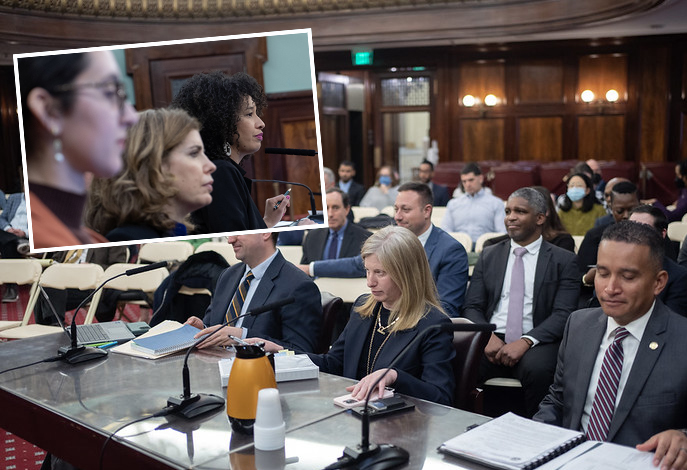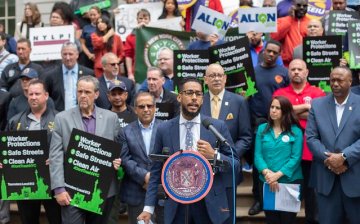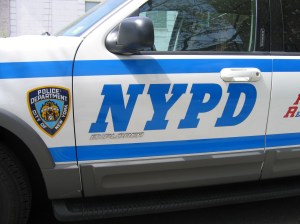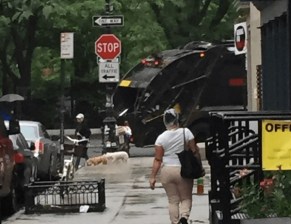Council to DSNY Commish: Move Faster on Rogue Carting Biz

The city’s long-awaited overhaul of the rogue private carting industry won’t begin until late 2024 at the earliest — five years after the reforms became law, Sanitation Commissioner Jessica Tisch revealed on Wednesday.
Tisch sought for patience with the slow rollout — while warning it would take another two years after the initial launch to be up and running citywide, confirming previous reporting by Streetsblog that the program had been delayed by the Adams Administration.
And despite writing in Streetsblog hours before her testimony that the full rollout would not take “many” years, Tisch suggested under questioning that it would:
“I reserve the right to adjust that timeline, but I assure you that I will provide regular updates as the procurement rules permit,” she told Council members.
“I may be coming back to you and saying, ‘Sorry, I have new information. It’s not going to be in the second quarter of 2024.’ Given what I know today…I think we will start our first pilot in the second half of 2024, but also know that things can change between now and then.”
But she repeated much of what she said in the earlier op-ed — that creating this program from scratch takes time if the city wants to do it right:
“Before last year, the Department of Sanitation was not focused enough on preventing unsustainable price increases at a time when small businesses are already struggling,” she said. “Since then, we have reprioritized keeping prices down without sacrificing commitments to safety and worker protection, a no-brainer given that cost hikes nearly killed commercial waste reform in Los Angeles. These kinds of programs do lead to higher costs to businesses when they are done wrong — sometimes even when they’re done right.”
The 2019 reform law tasked the city with creating 20 designated waste collection zones and assign not more than three companies to pick up trash in each zone, replacing a free-for-all system and cut-throat competition that led to reckless driving and road fatalities.
The Council-mandated reform effort sought to dramatically reduce the miles traveled by the city’s carting fleet from 23 million per year to five million per year — a decrease of 78 percent — improve worker conditions, and relieve burdens in environmental justice communities.

Council members who spoke at Wednesday’s hearing expressed frustration with the city’s apparent lack of urgency, and urged Tisch to speed up the process.
“How many years have you been working on this issue?” asked Council Member Lincoln Restler (D-Brooklyn). “And here we are still waiting for implementation. This bill will make an enormous difference in advancing environmental justice, and worker justice, in safety in our communities.”
Others were dubious that the agency will even make its new timeline next year. Tisch admitted that the agency has not yet done any outreach to small businesses.
“You said in your testimony that you reserve the right to revisit the timeline [but] how confident are you that you’ll be able to meet this new timeline?” said Council Member Julie Menin (D-Manhattan).
The ongoing delay has deadly consequences: Just last month, 58-year-old Diego Andrade was killed on Kings Highway in Brooklyn by the driver of Metropolitan Recycling — a mid-sized non-union private carting company that advocates have said “would be subject to the safety standards” that are part of the law the DSNY is lagging behind on mandating.
“Three years and three months since it became law, as we sit here today, the Commercial Waste Zone program has yet to be implemented,” said Eric McClure of StreetsPAC. “The existing system, if one can even call it that, in which different carting companies drive haphazard routes that can crisscross the entire city, leads to some of the most dangerous driving behaviors one can imagine: blatant running of red lights, driving against the direction of traffic, reversing through intersections, and reckless speeding. Anyone who’s walked a street late at night in New York City has witnessed this firsthand.”
Tisch said the DSNY opposes Brooklyn Council Member Sandy Nurse’s bill to launch a “working group” to make sense of the ongoing delays to the program passed and signed under ex-Mayor Bill de Blasio. She repeatedly referenced a similar reform effort in Los Angeles in 2017, which she claimed caused prices for businesses to skyrocket.
Elected officials who back the reforms called that mere “speculation” and said their biggest concern is not costs, but how to start transitioning to a new system of trash pickup.
“I think we can have a conversation about cost in a more reasonable way. We were ready for all the concerns and the errors that could possibly exist,” said Brooklyn Borough President Antonio Reynoso, who fought and introduced the original legislation that’s now law.
“The conversation I’m having internally with folks is that cost is not the biggest concern, it’s the transition. They need to know what they’re going to do right now so they can start preparing for the future. Transition is the biggest concern they have.”




